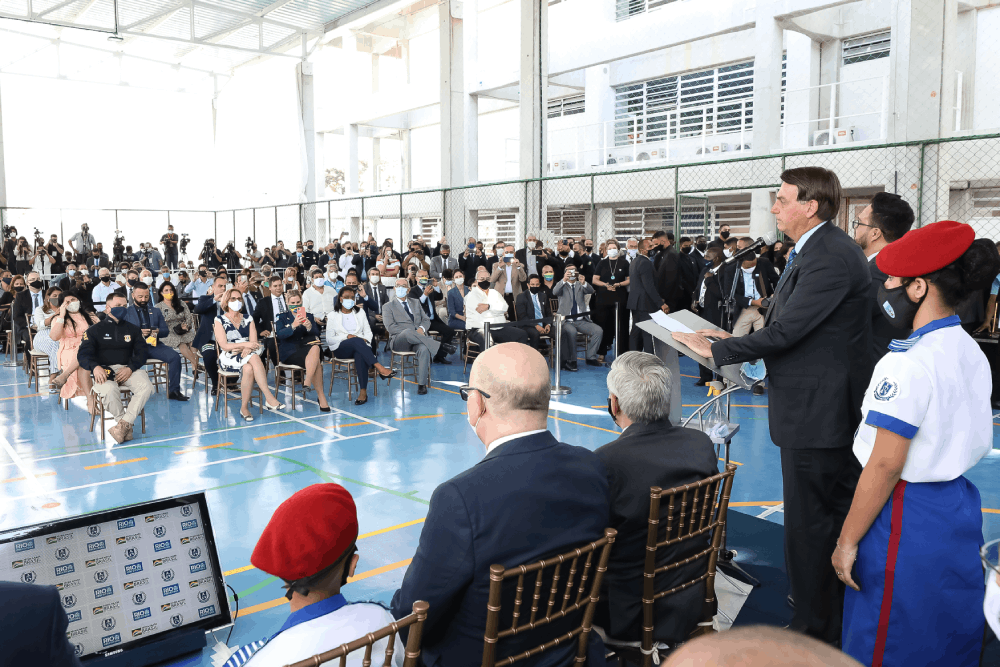Viviane Peixoto da Cunha, Associate Professor at the Faculty of Education of the State University of Rio de Janeiro (UERJ), Rio de Janeiro, RJ, Brazil.
Alice Casimiro Lopes, Professor at the Faculty of Education of the State University of Rio de Janeiro (UERJ), Rio de Janeiro, RJ, Brazil.

In the election campaign of Jair Bolsonaro in 2018, it was already possible to identify a strong fantasy being built through his speeches, highlighting the performance of the Armed Forces as an allied institution for solving various social problems, including educational ones. The idea that a military intervention in the school would be necessary gained strength in his government and was legitimized, through the PECIM, implemented in 2019.
The conservative demands articulated in this Program and the reasons why the molds of military schools are now being extolled by many under the justification of presenting “order” and “quality” are the focus of discussion of the article entitled “Militarization of the management of public schools: the exclusion of democratic political activity“, published in the journal of Educação & Sociedade (vol. 43). The text argues that the Program prescribes an authoritarian proposal for education and threatens our democracy.
Based on the political theory of discourse proposed by Ernesto Laclau and Chantal Mouffe, the analysis highlights that the Program articulates demands: a) Moral and behavioral – projecting Salvationist discourses, which are meant to prevent the disorder, disorganization and destruction of social identities (in this case, the identity of the family or the Brazilian nation, for example); b) Instrumental – defending a school against a conjecture “ideological indoctrination” with a conception of teaching that is equivalent only to the transmission of a supposedly neutral knowledge; and c) Neoliberals – reinforcing the search for the efficiency of the school based on criteria of excellence based on the establishment of goals of performance indicators.

Image: Wikimedia Commons
Although it is recognized in the study that the disfigurement of the democratic political actions of the management of the Brazilian public school is a mark of the neoliberal educational reform, inaugurated in the 1990s, what was sought discussed was of another content. The article focuses on the hegemony agenda of an explicitly authoritarian project for education.
According to Lopes (2019), it is also worth noting that the Program is part of Bolsonaro’s political strategy, which sought to provide an image of fullness, totality, salvation or harmony in its proposals while situated threats and obstacles to the realization of this fullness by the enemy (in this case, the left-wing, represented by the supposed “cultural Marxism” in schools and universities), which should be fought as a cause of social horror.
Finally, we consider not only the need, but also the urgency of thinking about alternative ways of establishing the challenge of the new social dynamics sutured and with different political identifications emerging in the current political conjuncture and suggests the strand of radical and plural democratic politics proposed by Laclau and Mouffe (2015) as an option of dispute for other discourses and, therefore, other hegemonies, to think about the management of education in the political clash with the authoritarianism of the ongoing militarization.
References
LACLAU, E. and MOUFFE, C. Hegemonia e estratégia socialista: por uma política democrática radical. São Paulo: Intermeios, 2015.
LOPES, A.C. Articulações de demandas educativas (im)possibilitadas pelo antagonismo ao “marxismo cultural”. Arquivos Analíticos de Políticas Educativas [online]. 2019, vol. 27, pp. 109-129 [viewed 21 November 2022]. https://doi.org/10.14507/epaa.27.4881. Available from: https://epaa.asu.edu/index.php/epaa/article/view/4881
To read the article, access:
CUNHA, V.P. and LOPES, A.C. Militarização da gestão das escolas públicas: a exclusão da atividade política democrática. Educ. Soc. [online]. 2022, vol. 43, e258252 [viewed 21 November 2022]. https://doi.org/10.1590/ES.258252. Available from: https://www.scielo.br/j/es/a/QjXXtGBRt8JHqsyKn335nWK/
Como citar este post [ISO 690/2010]:
















Recent Comments